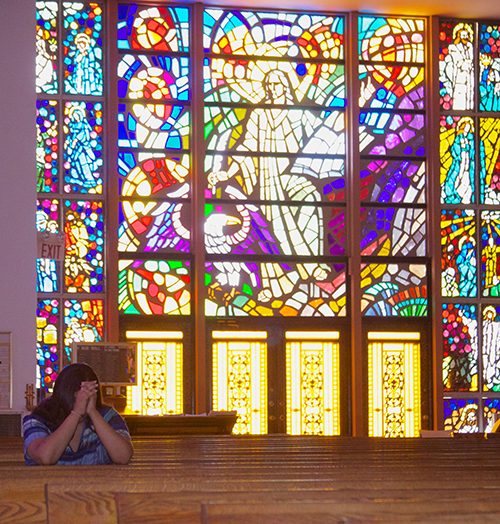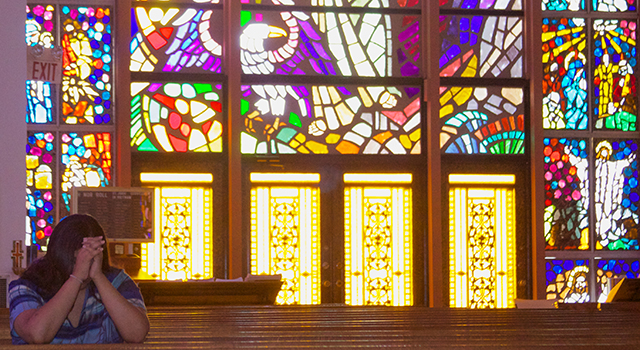By Ana Rodriguez Soto - Florida Catholic newspaper
MIAMI | Pope Francis made headlines again Sept. 1 when he announced that priests throughout the world will be able to forgive the sin of abortion during the Jubilee Year of Mercy — Dec. 7, 2015 through Nov. 20, 2016.
But priests in the Archdiocese of Miami have had that faculty since the mid-1980s, as have priests throughout Florida since perhaps 1980.
“We’ve had the faculties in Miami for a long time,” said Msgr. George Puthusseril, Miami’s judicial vicar — chief canon lawyer — and head of the Metropolitan Tribunal. He added that he thought the same was true for “most dioceses in the U.S.”
But to say that priests can now “forgive the sin” of abortion is a bit misleading, said Msgr. Michael Souckar, pastor of St. Andrew Church in Coral Springs and adjutant (assistant) judicial vicar. The faculties being granted actually refer to something beyond absolution.
“What the Holy Father has done is to extend to all priests the faculty to absolve the censure (penalty of excommunication) incurred by procuring an abortion, not the absolution of the sin,” Msgr. Souckar explained. “All priests who have the faculty to hear confessions also have, by the same faculty, the ability to forgive the sin of abortion. It is the absolution of the censure (not the sin) that is reserved to the diocesan bishop.”
Because the Church considers abortion such a grave sin, Canon 1398 in the Code of Canon Law states: “A person who procures a completed abortion incurs a latae sententiae excommunication.” Latae sententiae essentially means “automatic.”

Photographer: Jonathan Martinez | FC
A woman prays during the archdiocesan Reconciliation Weekend held during Lent 2013 at St. John the Apostle Parish in Hialeah.
Under canon law, the power — faculty — to remove that censure —excommunication — is reserved to the diocesan bishop. He can, in turn, grant it to his priests.
Miami’s second archbishop, Edward McCarthy, did so in September 1986, when he declared a Jubilee Year of Reconciliation in preparation for the September 1987 visit of Pope John Paul II to Miami.
In a pastoral letter announcing the year, he said, “I am extending to all priests who have received faculties to hear confessions from the Archdiocese of Miami the special faculty to absolve, in the act of the sacrament of Reconciliation, from the censures of Canon 1398 incurred by those who have procured an abortion and those who have assisted at it.”
An article in the Sept. 19, 1986 edition of the Florida Catholic, referring to Archbishop McCarthy’s decree, noted that “most, if not all, the other dioceses in Florida have given their priests perpetual faculties … to absolve in abortion cases.”
The Florida Catholic Conference’s document, “Post Abortion Reconciliation Program Guidelines,” approved by all the bishops of the state in 1992, seems to assume that priests throughout the state already have those faculties.
It states: “Spiritual healing remains the most important element in this program. The sacrament of Reconciliation is the most powerful and necessary component for Catholics.
“Whenever possible, it is desirable that the person receive the sacrament from a priest who has been trained in post-abortion counseling. A Catholic who has already received the sacrament but remains troubled, can often benefit from a session(s) with a Project Rachael trained priest.
“A non-Catholic who seeks the program should also be offered an opportunity to meet with a priest or minister who understands post-abortion trauma and healing.”
Project Rachel and Rachel’s Vineyard retreats have been offered in the Archdiocese of Miami since the late 1980s. (See box below)
What Pope Francis has done now is bypass the bishops throughout the world who have not given that faculty to their priests, Msgr. Puthusseril said. Every priest will have it during the Year of Mercy.
He noted that the pope’s Year of Mercy announcement changes nothing for those women — or men — who already have received absolution after confessing involvement in the procurement of an abortion.
“All the absolutions that have been given are all valid,” Msgr. Puthusseril stressed.
Pope Francis made his intentions known in a letter to Archbishop Rino Fisichella, president of the Pontifical Council for the Promotion of New Evangelization. That’s the office which is organizing the events for the holy year.
In the letter, the pope says that “one of the serious problems of our time is clearly the changed relationship with respect to life… The tragedy of abortion is experienced by some with a superficial awareness, as if not realizing the extreme harm that such an act entails.”
He added, however, that many women experience abortion “as a moment of defeat,” believing they have “no other option.”
Speaking of those women, he writes: “I am well aware of the pressure that has led them to this decision. I know that it is an existential and moral ordeal. I have met so many women who bear in their heart the scar of this agonizing and painful decision. What has happened is profoundly unjust; yet only understanding the truth of it can enable one not to lose hope. The forgiveness of God cannot be denied to one who has repented, especially when that person approaches the Sacrament of Confession with a sincere heart in order to obtain reconciliation with the Father.”
Those words echo the ones written by St. John Paul II near the end of his encyclical, Evangelium Vitae, the Gospel of Life: “I would now like to say a special word to women who have had an abortion. The Church is aware of the many factors which may have influenced your decision, and she does not doubt that in many cases it was a painful and even shattering decision. The wound in your heart may not yet have healed. Certainly what happened was and remains terribly wrong. But do not give in to discouragement and do not lose hope. Try rather to understand what happened and face it honestly. If you have not already done so, give yourselves over with humility and trust to repentance. The Father of mercies is ready to give you his forgiveness and his peace in the sacrament of Reconciliation.”
Pope Francis did break new ground, however, when he said those who go to confession with priests from the Fraternity of St. Pius X also will “validly and licitly receive the absolution of their sins.”
The Fraternity of St. Pius X was founded by Archbishop Marcel Lefebvre in 1970, in response to what he perceived as “errors” of the Second Vatican Council. The Fraternity’s members incurred automatic excommunication when Archbishop Lefebvre consecrated four bishops without the permission of Pope John Paul II.
While Pope Benedict XVI lifted that excommunication in 2009, the Fraternity and the Vatican are still negotiating to re-establish full communion.
In his letter, Pope Francis also speaks of the indulgences granted every jubilee year, adding special provisions during the Year of Mercy for those who, for various reasons, find it “impossible to enter the Holy Door,” particularly the sick, the elderly, those who are confined to their homes and those in prison.
“Living with faith and joyful hope this moment of trial, receiving Communion or attending Holy Mass and community prayer, even through the various means of communication, will be for them the means of obtaining the Jubilee Indulgence,” the pope says of the sick and infirm.
As for prisoners, “They may obtain the indulgence in the chapels of the prisons. May the gesture of directing their thought and prayer to the Father each time they cross the threshold of their cell signify for them their passage through the Holy Door, because the mercy of God is able to transform hearts, and is also able to transform bars into an experience of freedom.”
Updated Sept. 2: Added clarification from Msgr. Michael Souckar and quote from St. John Paul II's "Gospel of Life."
WHERE TO SEEK HELP
Project Rachel is a one-on-one session between the counselor and the women (or men) seeking assistance with post-abortion healing. Project Rachel counselors are available in each of the archdiocese’s five emergency pregnancy centers. The process is entirely confidential and one-on-one. After the individual counseling, which takes about eight or nine weeks, the women can attend a Rachel’s Vineyard weekend retreat in English or Spanish.
To reach a Project Rachel counselor, call 954-981-2984 or e-mail [email protected]. The toll-free number for Project Rachel is 888-456-4673.


Comments from readers